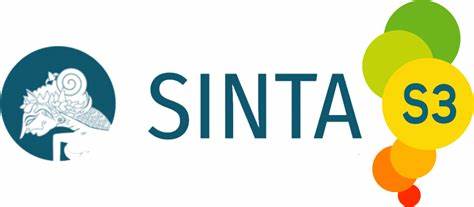COMPLIMENTS AND COMPLIMENT RESPONSES IN YOUTUBE COMMENTS
Keywords:
Compliment, Compliment responses, Types of complimentAbstract
This study investigated types of compliments used by netizen and the responses towards the compliments found in YouTube comments. Qualitative descriptive research methods was employed in this study. The data source comes from Youtube Comments on the NFL's web page entitled Rihanna's Full Apple Music Super Bowl LVII Halftime Show. The data was collected by using documentation and then analyzed by using content analysis. The findings revealed that there were three types of compliments found in the comments such as 7 appearances (7), skill / abilities (16) and personalities (2). It can be concluded that ability compliment was the most frequent appearing of compliments types. In addition, the data also showed that there were six compliment strategies found in the comments such as 5 Comment acceptance, 1 reassignment, 2 return, 1 question, 2 disagreements and 1 request interpretation.
References
Al-Shboul, Y., Huwari, I. F., Al-Dala’ien, O. A., & Al-Daher, Z. (2022). An analysis of compliment response strategies by Jordanian adolescent students: The influence of gender and Social Power. Theory and Practice in Language Studies, 12(7), 1252-1261.
Alqarni, S. (2017). A sociolinguistic investigation of compliments and compliment responses among young Saudis (Doctoral dissertation, Western Sydney University (Australia)).
Asmianti, A. (2013). The Compliment Responses By Buginese Community In Bone Regency (South Sulawesi)(Discourse Analysis) (Doctoral dissertation, Universitas Hasanuddin).
Culpeper, J., & Pat, K. (2021). Compliment Responses In Hong Kong: An Application Of Leech’s Pragmatics Of Politeness. Text and Talk, 41(5–6), 667–690. https://doi.org/10.1515/text-2020-0047
Danziger, R. (2018). Compliments And Compliment Responses In Israeli Hebrew: Hebrew University in Jerusalem Students In Interaction. Journal of Pragmatics, 124, 73–87. https://doi.org/10.1016/j.pragma.2017.12.004
Holmes, J. (2003). Complimenting: A positive politeness strategy in Sosiolinguistic: The essential readings. Hlm 177-197.
Herbert, R. K. (1989). The ethnography of English compliments and compliment responses: A contrastive sketch. Contrastive pragmatics, 3-35.
Jamaluddin, A. F (2018). Compliments and Compliment Responses Used in America’s Got Talent 2017 (Doctoral dissertation, Universitas Muhammadiyah Surakarta).
Kartika, D., & Riza, F. J. (2022). The Speech Acts of Compliments among Japanese Teenagers in Japanese Anime Films. Leksema: Jurnal Bahasa dan Sastra, 7(2), 85-94.
Masykuroh, Q. (2021, October). A Study on Javanese Learners of English and Compliment Response Strategies. In Proceedings of the 1st International Seminar on Teacher Training and Education, ISTED 2021, 17-18 July 2021, Purwokerto, Indonesia.
Mokoginta, K. (2023, June). Compliments in Indonesian Cultures: A Literature Review. In 3rd International Conference on Linguistics and Cultural (ICLC 2022) (pp. 260-270). Atlantis Press.
Placencia, M. E., & Lower, A. (2017). Compliments and Compliment Responses. Pragmatics of Social Media, January 2017, 633–660. https://doi.org/10.1515/9783110431070-023
Pomerantz, A. (1978). Compliment responses: Notes on the co-operation of multiple constraints. In Studies in the organization of conversational interaction (pp. 79-112). Academic Press.
Rahmayani, F. A. (2020). Cross Cultural Pragmatics: Compliment Response Strategy Used on the British and Indonesian Talk show. IDEAS: Journal on English Language Teaching and Learning, Linguistics and Literature, 8(2), 384-397.
Saifi, M. A., Sakhi, S., & Sultani, A. (2017). Compliment and Compliment Responses : A Comparative Study between Dari and English Native Speakers. 7(11), 104–109.
Sucuoğlu, E., & Bahçelerli, N. M. (2015). A study of compliment responses in English: a case of North Cyprus. Procedia-Social and Behavioral Sciences, 174, 3285-3291.
Tursunovich, S. E. (2022). Classification of compliments as speech acts and their basic characteristics in Uzbek and English languages. Eurasian Journal of Learning and Academic Teaching, 4, 77-79.
White, A. R., Austin, J. L., & Urmson, J. O. (1963). How To Do Things With Words. In Analysis (Vol. 23, p. 58). https://doi.org/10.2307/3326622
Zatulhimmi, Z., & Muslem, A. (2022). The strategies used by English department students in giving and receiving compliments. English Education Journal, 13(1), 12-31.
Al-Shboul, Y., Huwari, I. F., Al-Dala’ien, O. A., & Al-Daher, Z. (2022). An analysis of compliment response strategies by Jordanian adolescent students: The influence of gender and Social Power. Theory and Practice in Language Studies, 12(7), 1252-1261.
Alqarni, S. (2017). A sociolinguistic investigation of compliments and compliment responses among young Saudis (Doctoral dissertation, Western Sydney University (Australia)).
Asmianti, A. (2013). The Compliment Responses By Buginese Community In Bone Regency (South Sulawesi)(Discourse Analysis) (Doctoral dissertation, Universitas Hasanuddin).
Culpeper, J., & Pat, K. (2021). Compliment Responses In Hong Kong: An Application Of Leech’s Pragmatics Of Politeness. Text and Talk, 41(5–6), 667–690. https://doi.org/10.1515/text-2020-0047
Danziger, R. (2018). Compliments And Compliment Responses In Israeli Hebrew: Hebrew University in Jerusalem Students In Interaction. Journal of Pragmatics, 124, 73–87. https://doi.org/10.1016/j.pragma.2017.12.004
Holmes, J. (2003). Complimenting: A positive politeness strategy in Sosiolinguistic: The essential readings. Hlm 177-197.
Herbert, R. K. (1989). The ethnography of English compliments and compliment responses: A contrastive sketch. Contrastive pragmatics, 3-35.
Jamaluddin, A. F (2018). Compliments and Compliment Responses Used in America’s Got Talent 2017 (Doctoral dissertation, Universitas Muhammadiyah Surakarta).
Kartika, D., & Riza, F. J. (2022). The Speech Acts of Compliments among Japanese Teenagers in Japanese Anime Films. Leksema: Jurnal Bahasa dan Sastra, 7(2), 85-94.
Masykuroh, Q. (2021, October). A Study on Javanese Learners of English and Compliment Response Strategies. In Proceedings of the 1st International Seminar on Teacher Training and Education, ISTED 2021, 17-18 July 2021, Purwokerto, Indonesia.
Mokoginta, K. (2023, June). Compliments in Indonesian Cultures: A Literature Review. In 3rd International Conference on Linguistics and Cultural (ICLC 2022) (pp. 260-270). Atlantis Press.
Placencia, M. E., & Lower, A. (2017). Compliments and Compliment Responses. Pragmatics of Social Media, January 2017, 633–660. https://doi.org/10.1515/9783110431070-023
Pomerantz, A. (1978). Compliment responses: Notes on the co-operation of multiple constraints. In Studies in the organization of conversational interaction (pp. 79-112). Academic Press.
Rahmayani, F. A. (2020). Cross Cultural Pragmatics: Compliment Response Strategy Used on the British and Indonesian Talk show. IDEAS: Journal on English Language Teaching and Learning, Linguistics and Literature, 8(2), 384-397.
Saifi, M. A., Sakhi, S., & Sultani, A. (2017). Compliment and Compliment Responses : A Comparative Study between Dari and English Native Speakers. 7(11), 104–109.
Sucuoğlu, E., & Bahçelerli, N. M. (2015). A study of compliment responses in English: a case of North Cyprus. Procedia-Social and Behavioral Sciences, 174, 3285-3291.
Tursunovich, S. E. (2022). Classification of compliments as speech acts and their basic characteristics in Uzbek and English languages. Eurasian Journal of Learning and Academic Teaching, 4, 77-79.
White, A. R., Austin, J. L., & Urmson, J. O. (1963). How To Do Things With Words. In Analysis (Vol. 23, p. 58). https://doi.org/10.2307/3326622
Zatulhimmi, Z., & Muslem, A. (2022). The strategies used by English department students in giving and receiving compliments. English Education Journal, 13(1), 12-31.
Downloads
Published
Issue
Section
License

This work is licensed under a Creative Commons Attribution-ShareAlike 4.0 International License.
The author is responsible for acquiring the permission(s) to reproduce any copyrighted figures, tables, data, or text that are being used in the submitted paper. Authors should note that text quotations of more than 250 words from a published or copyrighted work will require grant of permission from the original publisher to reprint. The written permission letter(s) must be submitted together with the manuscript.




